Group activities can be a great way to get people together and help foster friendship, communication, problem-solving skills, and of course – having fun! In this article, you will find some awesome group activity ideas specifically designed for adults with intellectual disabilities.
Group activities don’t have to be complicated or expensive either – they can often involve simple items that you already have around the house. Whether it’s board games, outdoor sports, or arts & crafts; these activities are sure to entertain your participants in a social setting. Plus, since everyone is participating at their own level, no one feels left out!
Last but not least: when planning any kind of group activities for adults with intellectual disabilities it’s important to remember safety first. That means making sure all equipment used is appropriate for the age range involved and that there are enough staff members on hand to supervise as needed.
With that said, let’s jump into our list of fun-filled group activity ideas perfect for adults with intellectual disabilities!
Read More: Engaging Group Activities for Geriatric Patients: A Guide to Improving Quality of Life.
In A Glance
10 Fun Group Activities Ideas For Adults With Intellectual Disabilities

- Arts and crafts projects: Engage in fun and creative activities like painting, drawing, collage-making, and pottery.
- Music therapy: Encourage individuals to participate in a music therapy session where they can listen to or play music, sing along, and learn new instruments.
- Cooking classes: Teach individuals how to cook easy and healthy meals, including preparing ingredients, cooking techniques, and table setting.
- Exercise classes: Offer exercise classes tailored to their needs, such as yoga, Zumba, dance, or gentle stretching.
- Games and puzzles: Organize group games and puzzles that promote problem-solving, cognitive skills, and social interaction, such as board games, card games, and jigsaw puzzles.
- Outdoor activities: Plan outdoor activities like nature walks, picnics, and gardening that allow them to enjoy the fresh air and sunshine.
- Movie nights: Host movie nights where they can watch a variety of movies and engage in discussions afterward.
- Storytelling: Encourage individuals to share their stories and experiences, either through writing or oral storytelling, to promote self-expression and communication skills.
- Sensory activities: Provide sensory stimulation activities, such as touch-based games, scented oils, and textured materials like sand or playdough.
- Volunteer work: Encourage individuals to participate in volunteer work that supports the community, such as helping out at a local animal shelter or food bank.
Types Of Group Activities

It’s time to get creative! While providing care and support for adults with intellectual disabilities can be challenging, it is also incredibly rewarding. For those looking for ideas on group activities that promote socialization and inclusion, there are plenty of great suggestions out there.
From outdoor activities such as camping trips and picnics to team sports like bowling or kickball, there are countless options when it comes to group activities for adults with intellectual disabilities:
- Outdoor Activities: Camping, hiking, biking, fishing, swimming
- Team Sports: Bowling, softball, basketball
- Puzzles & Mazes: Crosswords, word searches, mazes
- Music Activities: Sing-alongs, rhythm games
- Cooking Projects: Baking cookies or making pizza together
These types of activities provide individuals with intellectual disabilities the chance to interact with their peers in a safe environment while having fun and learning new skills at the same time!
Not only do they offer physical benefits such as improved coordination and self-confidence but they also help develop communication skills and foster friendships among participants.
It may seem daunting to come up with engaging activity ideas but with some creativity and patience, you can plan an exciting day your group will never forget!
Benefits Of Group Activities For Adults With Intellectual Disabilities

Adults with intellectual impairments can benefit greatly from participating in group events. They give people the chance to connect socially, spend time with loved ones, and have important experiences that are crucial for their personal development.
Individuals with cerebral disabilities also gain from group activities because they boost their self-esteem, sharpen their minds, and reduce tension.
Group activities have been found to enhance communication abilities and elicit good feelings through enjoyable and engaging activities, in addition to the many advantages listed above. Additionally, in a supportive setting, these pursuits can inspire people to take initiative and develop greater independence.
Participating in group activities helps cultivate relationships with others which increases overall happiness levels allowing for greater engagement in physical activity and healthier lifestyle choices.
Group activities allow adults with intellectual disabilities to gain important life skills while having fun at the same time! It is clear that there are many advantages of participating in group activities; however, it is also important to consider certain factors when planning such events.
Factors To Consider When Planning Activities
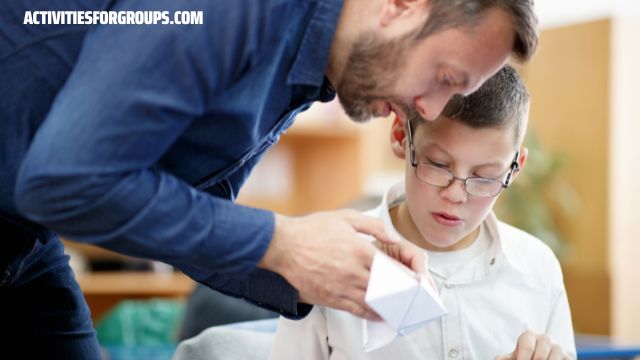
When planning activities for adults with intellectual disabilities, there are several factors to consider. Firstly, the age level of participants should be taken into account; different activities might suit younger or older adults better. Secondly, activity cost is another factor that needs to be considered when selecting an activity. Free and low-cost options may need to be explored in order to accommodate a range of budgets.
Thirdly, it’s important to think about how many people will take part in the activity; too many participants can lead to overcrowding and chaos! Finally, physical limitations and sensory considerations must also be taken into consideration.
For instance, if someone has trouble seeing clearly they might need larger print materials or audio support instead of visual aids during certain activities.
Having identified these factors, next we’ll look at adapting traditional games for use with adult groups who have intellectual disabilities.
Adapting Traditional Games
Adapting traditional games is a surefire way to make any activity night for adults with intellectual disabilities unforgettable! Whether you’re adapting board games, card games, or even outdoor activities like tag, there are endless possibilities for how to tailor the game so everyone can join in.
When it comes to board and card games, think about ways that players who may have difficulty understanding rules or counting cards might be able to participate. For example, if playing ‘Go Fish’ try assigning each player a colored fish instead of numbers on their cards.
This makes the game easier to understand and more inclusive for all participants. If playing Monopoly, put an emphasis on building houses together as opposed to focusing solely on getting money from other players by creating one pool of money that both teams draw from when needed.
Don’t forget about outdoor activities too! Try modifying tag by giving every participant a flag they can wear while running around.
The goal is still the same – avoid being tagged – but now everyone has something extra special they can show off at the end of the game! These small adjustments open up so many opportunities for adult groups with intellectual disabilities to enjoy classic activities in new and exciting ways.
To ensure everyone’s safety and enjoyment during these adaptations, remember to remind all participants of the modified rules before beginning play and throughout if necessary! That way everyone will know what’s expected which helps create an environment where everyone feels comfortable joining in.
Creating Unique Games
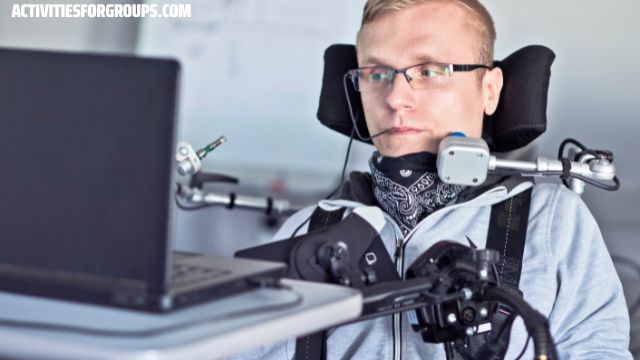
Creating unique games is a fun and creative way to engage adults with intellectual disabilities in group activities. It’s important to remember that each individual may have different preferences, so it’s best to tailor the activity as much as possible. Individuals can create their own games or modify existing ones based on their skill level and interests.
When designing the game, there are several components that need to be considered such as rules, materials needed for play, objectives of the game, and roles & responsibilities. Depending on the size of the group, individuals should be encouraged to work together by developing a team-based approach when creating a new game.
This will also encourage them to communicate with one another which helps build relationships between participants.
In addition to this, individuals should also be given the opportunity to express themselves through creative outlets during these activities. Providing them with an outlet where they feel comfortable expressing themselves, allows for more meaningful participation within the group setting.
When done correctly, these activities can provide great opportunities for growth and development amongst all involved parties! With that being said, let’s move on to exploring arts and crafts projects…
Arts And Crafts Projects
The arts and crafts projects provide a unique opportunity for adults with intellectual disabilities to express themselves. The colors, textures, and shapes of the materials used bring vibrancy to these activities, symbolizing hope in finding creative solutions. Through this work, participants can learn how to trust their own instincts and gain confidence in problem-solving skills.
We often use paper mache for crafting art pieces – like masks or sculptures – that reflect each person’s individual style. Other supplies include paints, markers, clay, and yarn which allow our clients to explore different mediums and discover new talents. Our goal is for them to feel empowered by creating something of value with their own hands.
At times we also collaborate as a group on larger-scale projects such as mural painting. This encourages teamwork while providing further opportunities to work together towards a common goal – an invaluable experience!
Community Outreach Programs
Promoting mature people with intellectual disabilities’ integration into society involves getting them involved in activities. These people have a great chance to engage with others and form deep relationships thanks to community outreach initiatives.
These classes also give them opportunities to learn new things, which can increase their freedom. Participating in neighborhood improvement initiatives close to where participants live is one successful illustration of a community outreach program.
They can give back to their communities and get exercise by participating in activities like trash picking or working at food pantries. They can interact and form bonds with other volunteers through such initiatives, which aids in their socialization and friendship-building.
Another type of program includes working with animals, such as raising therapy canines or helping at an animal sanctuary. It involves involving people with developmental impairments in activities. Strolling canines or playing with cats and bunnies, not only gives people important experiences but also encourages them to remain active. Individuals with impairments can grow in sensitivity and self-assurance by doing this.
These opportunities enable adults with intellectual disabilities to become involved in meaningful activities outside of what’s available within their own homes or care centers. They allow these individuals to have fun while developing important life skills like teamwork, communication, problem-solving, and leadership which will benefit them long term.
Resources For Activity Ideas
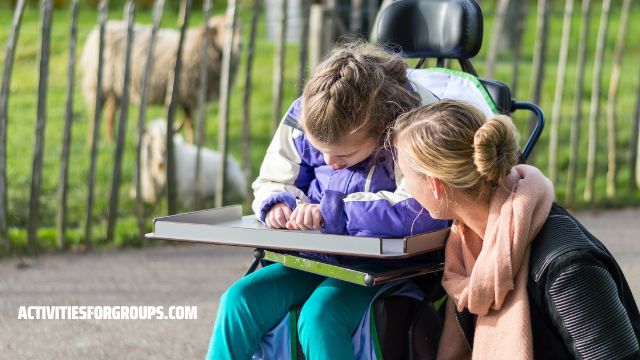
When caring for adults with intellectual disabilities, it’s important to provide them with engaging and stimulating activities that can help foster their sense of community. There are many resources available for activity ideas.
From disability-specific websites to organizations that specialize in providing group activities specifically designed with the needs of adults with intellectual disabilities in mind, finding fun and creative ways to keep your clients engaged has never been easier!
One great resource is Disability Activities Online, a website full of activity ideas tailored especially for those living with an intellectual disability. Here you will find everything from arts & crafts projects and indoor games to outdoor sports and recreational activities.
The site also provides helpful information on how best to support individuals during these activities as well as safety guidelines to ensure everyone involved remains safe while having fun.
In addition to online resources, there are several national organizations dedicated to helping caregivers create meaningful experiences for adults living with an intellectual disability.
These include Special Olympics which offers year-round sports training and competition opportunities; Best Buddies International, a non-profit organization that helps form friendships between people with and without ID; and Think College, a postsecondary program devoted solely to creating higher education options for students who have cognitive or developmental disabilities.
No matter what type of activity you’re looking for – whether it be physical or mental stimulation – there are plenty of fantastic resources out there ready to assist you in making sure your adult clients stay actively engaged throughout life’s journey.
With just a bit of research into these various outlets, caregivers can easily uncover endless possibilities when it comes to giving those under their care exciting new experiences day after day…transitioning now into the importance of addressing any potential safety concerns associated with each activity before proceeding.
Safety Concerns
When planning activities for adults with intellectual disabilities, safety is always a top priority. As an activity specialist, it’s essential that I include various safety measures when organizing group outings and events.
A risk assessment should be conducted prior to any event or outing; this will help identify potential hazards as well as areas of intervention in order to establish the safest environment possible.
Protective clothing such as helmets, protective eyewear, gloves, and proper footwear must also be taken into consideration depending on the type of activity being planned.
For outdoor activities like biking or hiking, participants should wear light-colored clothing that makes them visible from far away – reflective strips are great too! All supervised outings should follow emergency protocols that provide clear instructions for responding to medical emergencies or other unexpected situations.
I strive to ensure every participant has a safe and enjoyable experience during our organized activities. That’s why I take extra care to assess risks before we embark on any adventure and make sure everyone feels comfortable throughout the entire process.
Frequently Asked Questions [FAQs]
What Types Of Activities Are Best Suited For Adults With Intellectual Disabilities?

When it comes to activities for adults with intellectual disabilities, there are a plethora of options available! From adaptive sports and sensory activities to themed parties, art therapy, and cooking classes; the choices seem endless! As a group activity specialist, I’m here to tell you that these types of activities are not just fun – they can be highly beneficial in improving their quality of life.
Adaptive sports such as basketball or tennis provide opportunities for socializing while also getting physical exercise.
These kinds of activities promote engagement with peers while allowing individuals to learn new motor skills and stay physically fit. Furthermore, engaging in competitive sports encourages success and accomplishment.
Sensory activities like play dough creation or bubble blowing stimulate the senses but require a little direction from staff members. Such activities have been shown to increase focus, improve communication skills, and reduce stress levels which is incredibly important for adults living with intellectual disabilities.
Themed parties full of music, dancing, and costumes offer joyous experiences that will remain cherished memories for years to come! Art therapy is another wonderful way for adults with intellectual disabilities to express themselves creatively through painting or drawing without judgment.
And finally, cooking classes give them the chance to create delicious meals all while taking part in hands-on learning that builds confidence in meal preparation abilities.
No matter what type of activity you choose, it’s sure to bring out smiles to everyone’s faces! With so many unique ways both mentally stimulating and emotionally rewarding ways available today – why wouldn’t you want your loved one or client to experience them?
How Can I Ensure The Safety Of Participants While Engaging In Group Activities?
Safety should always come first when organizing group events for people with intellectual impairments. To have effective and enjoyable events, it is imperative to ensure the protection of all participants. I have several options for ensuring member safety during group activities as an activity expert for people with intellectual impairments.
First, it’s important to have clear safety measures in place before beginning any activity. This includes conducting risk assessments to determine which activities may not be suitable for certain individuals who have specific needs or abilities.
Additionally, I need to make sure everyone has necessary personal protective equipment like helmets or goggles if needed. Furthermore, making sure there is enough adult supervision per participant ratio will help prevent accidents from happening as well as providing assistance when needed.
Furthermore, when organizing group activities ideas for adults with intellectual disabilities, it’s also important to consider each individual’s cognitive level and physical capabilities beforehand.
For example, some people may require more support from caregivers than others; set up is also beneficial to provide visual aids such as diagrams or pictures that demonstrate steps within the activity so everyone understands what they are expected to do – this allows them to participate fully without feeling overwhelmed by too much verbal instruction at once.
Finally, offering incentives like rewards after completing tasks successfully can motivate individuals while still keeping safety at the forefront of all activities.
By taking into account these tips when planning group activities ideas for adults with intellectual disabilities, I am able to create experiences that allow participants to feel both supported and secure throughout their time together while still learning new skills and having fun!
Are There Any Special Considerations I Need To Keep In Mind When Planning Activities For Adults With Intellectual Disabilities?
When planning activities for adults with intellectual disabilities, it is important to take into consideration the special needs of each individual.
There are many adaptive activities and tasks that can be tailored to meet the specific needs of those living with an intellectual disability. As an activity specialist, there are several things you should keep in mind when creating engaging group activities:
- Task specialization – provides a variety of options so individuals can tailor their own experience based on their abilities.
- Sensory activities – use different types of materials or tools to help engage sensory processing difficulties by providing tactile stimulation.
- Social interaction – creates opportunities for socialization between participants by giving them a chance to interact with one another through shared interests or common goals.
- Intellectual disability support– choose activities that challenge yet don’t overwhelm participants’ skills and abilities; this will allow them to feel successful while participating in challenging tasks.
- Adaptive activities – create fun experiences that are accessible for all levels of functioning; these may include games, art projects, music, physical education, or other cooperative leisure pursuits.
By taking the time to consider all the aspects above, we can ensure that our adult participants have a safe and enjoyable experience while engaging in meaningful group activities.
It’s essential to remember that every person has unique challenges and strengths; as such, it is key to customize plans according to each participant’s level of ability while still allowing them room for growth and development both socially and cognitively.
By keeping these considerations top of mind, we can make sure everyone involved feels comfortable and supported throughout the entire process.
Are There Any Organizations Or Resources That Provide Additional Ideas For Activities?
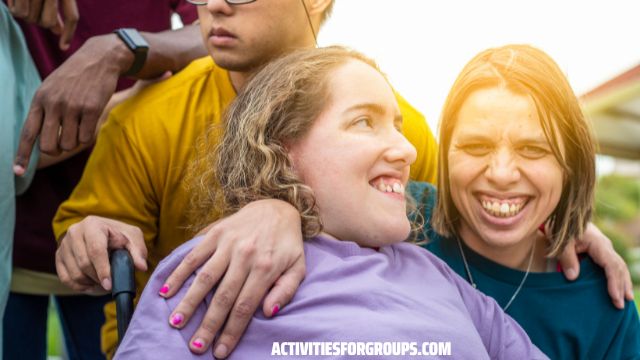
When planning activities for adults with intellectual disabilities, it is important to consider the unique needs of each individual. As an activity specialist for special needs, I am often asked if there are any organizations or resources that provide additional ideas for group activities.
The answer is yes! There are a variety of disability organizations and activity planners available to help create engaging experiences designed specifically for individuals with intellectual disabilities.
Finding the right option can be overwhelming so here’s what you need to know: many disability organizations offer a wide range of services such as recreational programs, educational support for parents, and even job training programs.
Some groups also specialize in providing tailored activities suitable for adults with intellectual disabilities, allowing them to experience the world around them within their own comfort level. Additionally, there are several online platforms dedicated to helping those looking for fun and safe activities that meet their specific needs.
These resources make it easier than ever before to find suitable activities which promote inclusion and independence while still being enjoyable and engaging. Whether you’re looking for one-on-one opportunities or group activities, there’s something out there that will fit your client’s abilities and interests.
Utilizing these resources can save time on research while giving people with intellectual disabilities access to exciting new experiences they may not have had otherwise.
Conclusion
In conclusion, group activities for adults with intellectual disabilities can be a great way to help them learn socialization skills and build self-confidence. Planning these activities safely is essential and requires consideration of the individual’s abilities in order to ensure that it is an enjoyable experience for all involved.
Organizations, resources, and online materials are available to give ideas on how to plan activities specifically catered to individuals who have intellectual disabilities.
According to recent studies conducted by The National Center For Health Statistics, 1 out of every 6 children between the ages of 3–17 has been diagnosed with a developmental disability such as autism or attention deficit hyperactivity disorder (ADHD).
As activity specialists for this population, it’s important that we come up with creative strategies to engage people with various levels of ability so they can get the most out of their experiences.
At its core, providing opportunities for growth through meaningful activities helps create an inclusive environment where everyone feels valued and respected regardless of their differences.
With thoughtful planning, I’m confident that we can continue creating exciting ways for those living with intellectual disabilities to learn new skills while having fun in the process!

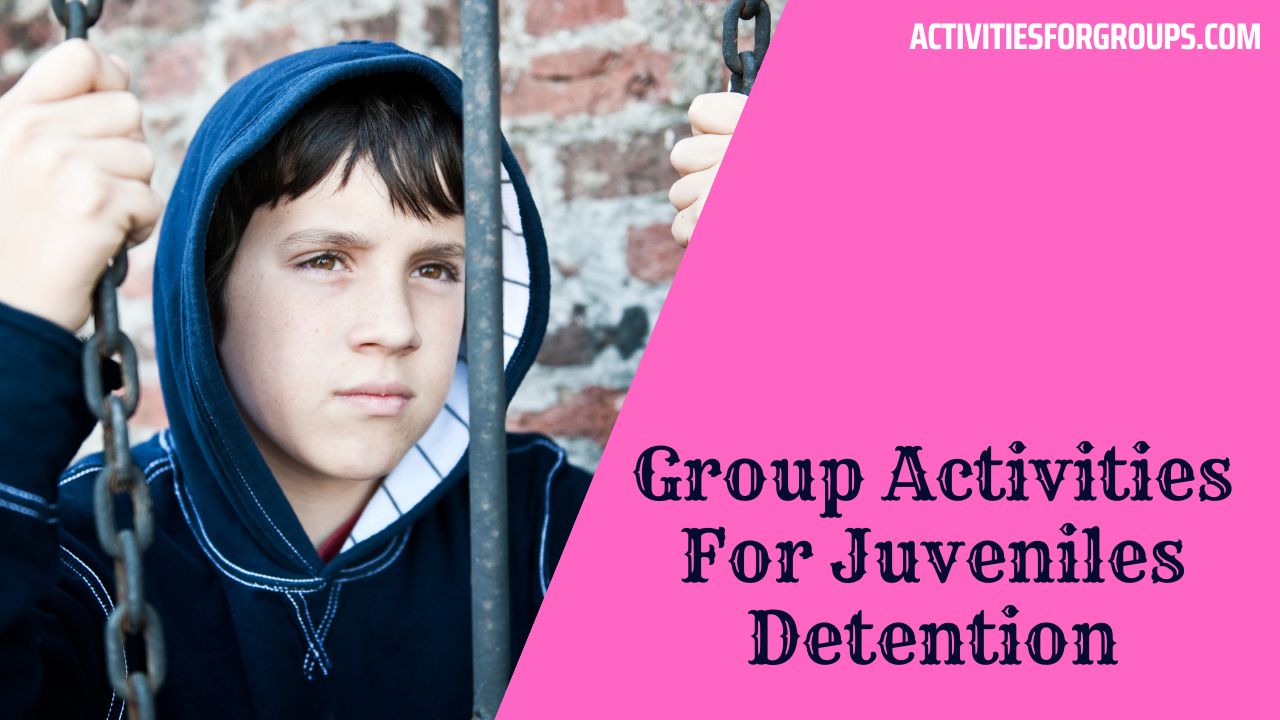


Leave a Reply